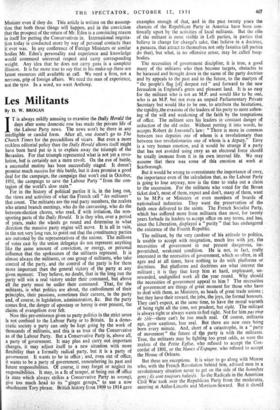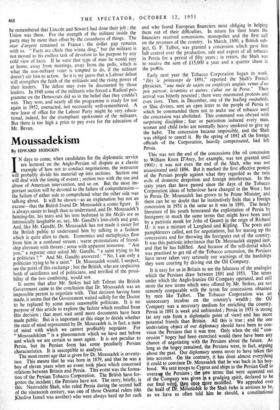Les Militants
ByD. W. BROGAN IT is always mildly amusing to examine the Daily Herald the days after some domestic row has made the private life of the Labour Party news. The news won't be there in any intelligible or candid form.. After all, one doesn't go to The Church Times for the peccadilloes of vicars. But even a more reckless editorial policy than the Daily Herald allows itself might have been hard put to it to explain away the triumph of the Bevanites. For that triumph represented what is not yet a revo- lution, but is certainly not a mere revolt. On the eve of battle, a successful mutiny has been successfully staged. It doesn't promise much success for this battle, but it does promise a good deal for the campaign, the campaign that won't end in October, 1951, the campaign to save the Labour Party " from the con- tagion of the world's slow stain."
For in the history of political parties it is. in the long run, the views and activities of what the French call "les militants" that count. The militants are the real party members, the zealots who attend branch meetings, who do the canvassing, who do the between-election chores, who read, if with irritation, the non- sporting parts of the Daily Herald. It is they who, over a period of years, make the wheels go round and determine in what direction the massive party engine will move. It is all in vain, in the not very long run, to point out that the constituency parties are outvoted by the representatives of the unions. The millions of votes cast by the union delegatis do not represent anything like the same amount of conviction, or energy, or personal influence that the spokesmen of the militants represent. It is almost always the militants, or one group of militants, who take control of the party, and the control of the party is for them more important than the general victory of the party at any given moment. They believe, no doubt, that in the long run the party will win a real victory under their command, but above all the party must be under their command. That, for the militants, is what politics are about, the embodiment of their principles, their passions, sometimes their careers, in the party and, of course, in legislation, administration, &c. But the party comes first, the danger of apostasy or heresy is ever present, the claims of evangelism ever felt. Now this pre-eminence given to party politics in the strict sense is not confined to the Labour Party or to Britain. In a demo- cratic society a party can only be kept going by the work of thousands of militants, and this is as true of the Conservative as of the Labour Party. But a Conservative Party is, above all, a party of government. It may plan and carry out important changes, it may adjust itself to a new situation with more flexibility than a formally radical party, but it is a party of government. It wants to be in office ; and, even out of office. it wants to be a party of government, remembering its past and future responsibilities. Of course, it may forget or neglect its responsibilities. It may. in a fit of temper, at being out ot office (a state which always strikes a Conservative Party as wrong). give too much head to its "ginger groups.' to use a now obsolescent Tory phrase. British history from 1909 to 1914 gave examples enough of that, and in the past twenty years the chances of the Republican Party in America have been con- tinually upset by the activities of local militants. But the role of the militant is most visible in Left parties, in parties that believe in change for change's sake, that believe in a doctrine, a panacea, that attract to themselves not only fanatics (all parties do that), but what, in no offensive sense, may be called busy- bodies.
The necessities of government discipline, it is true, a good many of the militants who then become targets, obstacles to be harassed and brought down in the name of the party doctrine and by appeals to the past and to the future, to the martyrs of " the people's flag [of] deepest red " and forward to the new Jerusalem in England's green and pleasant land. It is so easy for the militant who is not an M.P. and would like to be one, who is an M.P. but not even an unpaid Parliamentary Private Secretary but would like to be one, to attribute the hesitations, the tepidity.the evasions of the leaders of his party to mere softea- ing of the will and weakening of the faith by the temptations of office. The militant sees his leaders in-constant danger of seduction of the old order. Without putting it into words, he accepts Robert de Jouvenel's law : " There is more in common between two deputies one of whom is a revolutionary than between two revolutionaries one of whom is a deputy." Envy is a very human emotion, and it would be strange if a party that has not avoided using envy as an electoral force should be totally immune from it in its own internal life. We may assume that there was some of this emotion at work at Scarborough.
But it would be wrong to overestimate the importance of envy, the importance even of the calculation that, as the Labour Party is going to lose anyway, now is the time to stake out a claim to the succession. For the militants who voted for the Bevan ticket don't, most of them, expect and don't, many of them, want to be M.P.s or Ministers or even members of boards of nationalised industries. They want the preservation of the faith once delivered to the saints. The French Socialist Party, which has suffered more from militants than most, for twenty years forbade its leaders to accept office on any terms, and has, since the Liberation, displayed a " purity " that has endangered the existence of the Fourth Republic.
The militant, by the very candour of his attitude to politics, is unable to accept with resignation, much less with joy, the necessities of government in our present dangerous, im- poverished. weakened condition. He is not, in fact, really interested in the necessities of government, which so often, in all ages and at all times, have nothing to do with platforms or doctrines. But platforms and doctrines are what interest the militant ; it is they that keep him at hard, unpleasant. un- rewarded, undignified work all the year round. Why should the necessities of government appeal to him ? The necessities of government are things of great moment for those who have to deal with them, as Ministers, as heads of great trade unions ; but they have their reward, the jobs, the joys, the formal honours. They can't expect, at the same time, to have the moral warmth of being right all the time, not prudent, but right. The militant is always right or always wants to feel right. Not for him pas trop de zele—there can't be too much zeal. Of course, militants age, grow cautious, lose zeal. But there are new ones being born every minute. And, short of a catastrophe, in a " party of movement" the future of the party is with the militants. True, the militants may be fighting too great odds, as were the zealots of the Petite Eglise, who refused to accept the Con- cordat of 1801, or the blancs d'Espagne, who refused to accept the House of Orleans.
But these are exceptions. It is wiser to go along with Menou who, with the French Revolution behind him, advised men in a revolutionary situation never to get on the side of the honnetes' gens ; ils sons toujours balayes. So the Radicals in the American CiVil War took over the Republican Party from the moderates, sneering at Attlee-Lincoln and Morrison-Seward. But it should be remembered that Lincoln and Seward had done their job ; the Union was there. For- the strength of the militant inside the party may be more than offset by the cussedness of things. The -mur d'argent remained in France ; the dollar gap remains with us. " Facts are chiels that winna ding," but the militant is not moved to his endless task of devotion to his purpose by any cold view of facts. If he were that type of man he would stay at home, away from meetings, away from the polls, which is what the non-militant voter is tempted to do, if the militant doesn't stir him to action. So it is my guess that a Labour defeat will strengthen the faith of the militants and the rising power of their leaders. The defeat may even be discounted by those leaders. In 1948 some of the militants who forced a Radical pro- gramme on the Democrats did so in the belief that they couldn't win. They won, and nearly all the programme is ready for use again in 1952, unenacted, not necessarily well-remembered. A new lease of office for the Labour Party might be very, educa- tional, indeed, for the triumphant spokesmen of the militants. But there is too high a price to pay even for the education of Mr. Bevan.



































 Previous page
Previous page